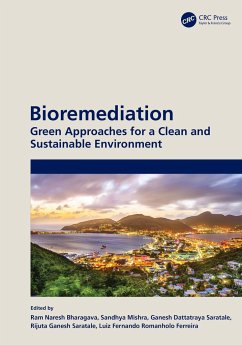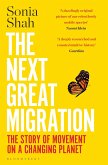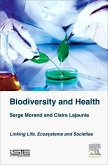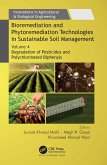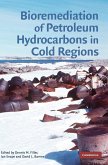Bioremediation
Green Approaches for a Clean and Sustainable Environment
Herausgegeben:Bharagava, Ram Naresh; Mishra, Sandhya; Dattatraya Saratale, Ganesh; Ganesh Saratale, Rijuta; Romanholo Ferreira, Luiz Fernando
Bioremediation
Green Approaches for a Clean and Sustainable Environment
Herausgegeben:Bharagava, Ram Naresh; Mishra, Sandhya; Dattatraya Saratale, Ganesh; Ganesh Saratale, Rijuta; Romanholo Ferreira, Luiz Fernando
- Gebundenes Buch
- Merkliste
- Auf die Merkliste
- Bewerten Bewerten
- Teilen
- Produkt teilen
- Produkterinnerung
- Produkterinnerung
Environmental sustainability with rapid industrialization is one of the current major global challenges. Industries are the key drivers of the world economy. But they are also the major polluters of the environment due to the discharge of partially treated/untreated toxic and hazardous wastes containing organic and inorganic pollutants, which cause severe environmental (soil and water) pollution and toxic effects in living beings. So the adequate treatment of industrial wastes to degrade/detoxify pollutants is of the utmost importance for environmental safety and for promoting the sustainable…mehr
Andere Kunden interessierten sich auch für
![Geoengineering Geoengineering]() Gernot WagnerGeoengineering81,99 €
Gernot WagnerGeoengineering81,99 €![Green Energy Futures: A Big Change for the Good Green Energy Futures: A Big Change for the Good]() David ElliottGreen Energy Futures: A Big Change for the Good38,99 €
David ElliottGreen Energy Futures: A Big Change for the Good38,99 €![The Next Great Migration The Next Great Migration]() Sonia ShahThe Next Great Migration10,99 €
Sonia ShahThe Next Great Migration10,99 €![Biodiversity and Health Biodiversity and Health]() Serge MorandBiodiversity and Health184,99 €
Serge MorandBiodiversity and Health184,99 €![Advances in Thin-Film Solar Cells Advances in Thin-Film Solar Cells]() I M DharmadasaAdvances in Thin-Film Solar Cells163,99 €
I M DharmadasaAdvances in Thin-Film Solar Cells163,99 €![Bioremediation and Phytoremediation Technologies in Sustainable Soil Management Bioremediation and Phytoremediation Technologies in Sustainable Soil Management]() Bioremediation and Phytoremediation Technologies in Sustainable Soil Management188,99 €
Bioremediation and Phytoremediation Technologies in Sustainable Soil Management188,99 €![Bioremediation of Petroleum Hydrocarbons in Cold Regions Bioremediation of Petroleum Hydrocarbons in Cold Regions]() Dennis Filler / Ian Snape / David Barnes (eds.)Bioremediation of Petroleum Hydrocarbons in Cold Regions138,99 €
Dennis Filler / Ian Snape / David Barnes (eds.)Bioremediation of Petroleum Hydrocarbons in Cold Regions138,99 €-
-
-
Environmental sustainability with rapid industrialization is one of the current major global challenges. Industries are the key drivers of the world economy. But they are also the major polluters of the environment due to the discharge of partially treated/untreated toxic and hazardous wastes containing organic and inorganic pollutants, which cause severe environmental (soil and water) pollution and toxic effects in living beings. So the adequate treatment of industrial wastes to degrade/detoxify pollutants is of the utmost importance for environmental safety and for promoting the sustainable development of our society with low environmental impacts.
Bioremediation: Green Approaches for a Clean and Sustainable Environment showcases the latest information on the different bioremediation approaches used for the many types of industrial pollutants and are dedicated to environmental safety. This book provides a detailed knowledge about the natural as well as anthropogenic sources of different types of toxic pollutants, such as toxic metals, dyes, pesticides, petroleum hydrocarbons and plastics; their fate and transport into the environment; their ecotoxicological effects and health hazards; and different approaches used for their bioremediation for the environmental clean-up.
Key Features:
Covers the different aspects of environmental problems and their remedies with up-to-date developments in the field of bioremediation of industrial/environmental pollutants
Serves as an invaluable source of knowledge for a wide range of students, scientists, and researchers in microbiology, biotechnology, environmental sciences with the fundamental and advanced knowledge about the environmental pollution, challenges, and bioremediation of toxic pollutants
Bioremediation: Green Approaches for a Clean and Sustainable Environment showcases the latest information on the different bioremediation approaches used for the many types of industrial pollutants and are dedicated to environmental safety. This book provides a detailed knowledge about the natural as well as anthropogenic sources of different types of toxic pollutants, such as toxic metals, dyes, pesticides, petroleum hydrocarbons and plastics; their fate and transport into the environment; their ecotoxicological effects and health hazards; and different approaches used for their bioremediation for the environmental clean-up.
Key Features:
Covers the different aspects of environmental problems and their remedies with up-to-date developments in the field of bioremediation of industrial/environmental pollutants
Serves as an invaluable source of knowledge for a wide range of students, scientists, and researchers in microbiology, biotechnology, environmental sciences with the fundamental and advanced knowledge about the environmental pollution, challenges, and bioremediation of toxic pollutants
Produktdetails
- Produktdetails
- Verlag: CRC Press / Taylor & Francis
- Seitenzahl: 268
- Erscheinungstermin: 5. Mai 2022
- Englisch
- Abmessung: 254mm x 178mm x 18mm
- Gewicht: 453g
- ISBN-13: 9781032019703
- ISBN-10: 1032019700
- Artikelnr.: 62952222
- Herstellerkennzeichnung
- Libri GmbH
- Europaallee 1
- 36244 Bad Hersfeld
- gpsr@libri.de
- Verlag: CRC Press / Taylor & Francis
- Seitenzahl: 268
- Erscheinungstermin: 5. Mai 2022
- Englisch
- Abmessung: 254mm x 178mm x 18mm
- Gewicht: 453g
- ISBN-13: 9781032019703
- ISBN-10: 1032019700
- Artikelnr.: 62952222
- Herstellerkennzeichnung
- Libri GmbH
- Europaallee 1
- 36244 Bad Hersfeld
- gpsr@libri.de
Dr. Ram Naresh Bharagava did B.Sc. (1998) in Zoology, Botany and Chemistry from University of Lucknow, Lucknow, Uttar Pradesh (U.P.), India and M.Sc. (2004) in Molecular Biology and Biotechnology from Govind Ballabh Pant University of Agriculture & Technology (GBPUAT), Pantnagar, Uttarakhand (U.K.), India. He obtained Ph.D in Microbiology in 2010 from CSIR-Indian Institute of Toxicology Research (CSIR-IITR), Lucknow and Pt. Ravishankar Shukla University, Raipur, Chhattisgarh, India. He has published more than ten (10) edited books and more than 160 publications in National and International journal of repute. He has an H-index: 36, i10-index: 75 and total citation 4598 to his credit. He is also serving as reviewer for various National and International journals in his field. Currently, Dr. Bharagava is working as a Sr. Assistant Professor and actively engaged in teaching and research activities in Government sponsored projects on biodegradation and bioremediation of environmental pollutants at Department of Environmental Microbiology (DEM), Babasaheb Bhimrao Ambedkar Central University, Lucknow (U.P.), India. His major thrust areas of research are the Biodegradation and Bioremediation of Environmental Pollutants, Environmental Toxicology, Metagenomics and Wastewater Microbiology. He is life member of the Indian Science Congress Association (ISCA), India, Association of Microbiologists of India (AMI), Biotech Research Society (BRSI), and Academy of Environmental Biology (AEB). He can be reached at bharagavarnbbau11@gmail.com and bharagavabiotech77@gmail.com. Dr. Sandhya Mishra obtained her PhD (2019) in the area of Environmental Microbiology from Department of Environmental Microbiology, Babasaheb Bhimrao Ambedkar (A Central) University (BBAU), Lucknow Uttar Pradesh (UP), India. She did her Ph.D on the microbial detoxification of chromium from tannery wastewater for environmental safety. She has published many research/review papers in National and International journal of high impact factor. She has also written mainly chapters for national and international edited books. She has been also served as a potential reviewer for several national and international journals in her respective areas of the research. Presently she is working as Post-Doctoral Fellow at State Key Laboratory for Conservation and Utilization of Subtropical Agro-bioresources, Integrative Microbiology Research Centre (IMRC), South China Agricultural University (SCAU), Guangzhou, China. Her major thrust areas of research are the Biodegradation and Bioremediation of Environmental Pollutants such as Heavy metals and Pesticides, Metagenomics, Quorum Sensing and Wastewater Microbiology. She is a member of the Association of Microbiologists of India (AMI), and Indian Science Congress Association (ISCA), India. She can be reached at sandhyamanshi@gmail.com sandhyamishra@scau.edu.cn. Dr. Ganesh Dattatraya Saratale currently works as Associate Professor in the Department of Food Science and Biotechnology, Dongguk University, South Korea (https://food.dongguk.edu/?staff=staff11). He obtained Ph.D. degree in Biochemistry in 2006 and conducted postdoctoral research in Taiwan, South Korea and India. He has received numerous prestigious domestic and international academic awards including; meritorious Departmental research fellowship (during Ph.D., India), Young Scientist award (Govt. of India), Brain Korea-21 (BK-21) (South Korea) and also completed two major research projects related to Lignocellulosic biorefineries. He has more than 175 publications in peer-reviewed scientific journals with total citations about 7700 and his H-index is 47 (Google Scholar) to his credit. He edited two books and also contributed 16 book chapters. He served as Editorial board member of many journals including Polymers, Applied Nano, Bioengineering International, Frontiers in Bioscience-Landmark, Nanomanufacturing and also worked as Guest Editor for International Journal of Hydrogen Energy and Bioresource Technology Reports (Elsevier). His major research focuses on the development of lignocellulosic biorefineries for biopolymers, hydrogen, ethanol and value added biochemicals production. His research interest as well devoted towards algal biofuels production, environmental biotechnology, bioelectrochemistry, nanotechnology and their application towards energy, environment, agriculture and medical fields. He also delivered keynote speeches and invited talks in various conferences, seminars and workshops. Dr. Rijuta Ganesh Saratale holds a PhD in Biotechnology (India) in the year 2010. She did postdoctoral studies in various International Universities/Institutes like University of Ostrava, Czech Republic, National Cheng Kung University, Taiwan, University of Pune, India and Ewha Womans University, South Korea. Presently, Rijuta is working as Assistant Professor in Research Institute of Biotechnology & Medical Converged Science, at Dongguk University, South Korea. Her main fields of expertise are environmental biotechnology, wastewater treatment, algal biofuels and Nanotechnology for energy, environment and medical sector. She was awarded with Young Scientist award, by Department of Science and technology, Govt. of India and also completed two major research projects related to bioremediation of environmental contaminants. So far, Rijuta has published more than 100 research publications in peer-reviewed journals (SCI/SCIE), 5 book chapters and one book. Her current H-index is 34 (Google Scholar) with over 5500 citations. She presented her research work in various National and International conferences and supervised about 21 Master theses. Dr. Luiz Romanholo is an Associate Professor at Tiradentes University and a researcher at the Institute of Technology and Research in Aracaju/Sergipe, Brazil. He earned his Ph.D. in microbiology from the University of São Paulo. He has over 120 scientific contributions in the form of Research, Reviews, Book Chapters, and Editorial type scientific articles in various fields of Science and Engineering. He had experienced as a visiting researcher at the Department of Molecular Biosciences and Bioengineering at the University of Hawaii at Manoa with Professor Samir Kumar Khanal. He is a level 2 researcher in technological development in environmental sciences at CNPq (DT-2) and serves on the editorial board of the World Journal of Microbiology and Biotechnology as well as Review Editor for Frontiers in Microbiology. He is a member of the Research Advisory Committee of the Foundation of Support to Research and Technological Innovation of the State of Sergipe [FAPITEC/ SE/BRAZIL] and reviewing advisor of research projects of several research foundations in Brazil, as FAPESP, the Brazilian National Council for Scientific and Technological Development (CNPq). He has an H-index = 13 along with more than 500 citations, and serves as a scientific reviewer in numerous peer-reviewed journals of high impact factors. Dr. Luiz Romanholo has a collaborative network with national and international institutes/universities across the globe. He is currently a member of the Society for Green Environment, India. Further, published more than sixty research articles with high-impact, and book chapters in the leading International and National journals or books.
1. Existing and Emerging Treatment Technologies for the Degradation and Detoxification of Textile Industry Wastewater for the Environmental Safety
Ajeet Singh, Roop Kishor, Ram Naresh Bharagava, and Bal Chandra Yadav
2. Nanotechnology: A Valuable Asset Contribution to Positive Impact on Environment
Ved Prakash Giri, Shipra Pandey, Madhuree Kumari, and Aradhana Mishra
3. Wastewater Treatment Using Biochar-Amended Constructed Wetland Systems
Vivek Rana and Jyoti Sharma
4. Treatment of Metalworking Effluent: Chemical Precipitation, Advanced Oxidative Processes and Biological Treatments
Daniel Delgado Queissada, Jesiel Alves da Silva, Vanessa Cruz dos Santos, Iraí Tadeu Ferreira de Resende, Débora da Silva Vilar, Ram Naresh Bharagava, and Luiz Fernando Romanholo Ferreira
5. Reducing Heavy Metal Toxicity using Biochar as a Naturally Derived Adsorbent
Iqbal Azad, Tahmeena Khan, Bhanu Pratap, and Abdul Rahman Khan
6. Bioremediation of Potentially Toxic Metals by Microorganisms and Biomolecules
Luciana Maria Saran, Bárbara Bonfá Buzzo, Cinara Ramos Sales, Renan Lieto Alves Ribeiro, and Lucia Maria Carareto Alves
7. Bacterial Biofilm Formation for the Remediation of Environmental Pollutants
Muhsin Jamal, Sayed Muhammad Ata Ullah Shah Bukhari, Liloma Shah, Sana Raza, Redaina, Muhammad Asif Nawaz, and Sidra Pervez
8. Sustainable Development in Agriculture by Revitalization of PGPR
Nandkishor More, Anjali Verma, Ram Naresh Bharagava, Arun S Kharat, Rajnish Gautam, and Dimuth Navaratna
9. Exploitation of Silver Nanoparticles in Bioremediation
Punabati Heisnam, Abhinash Moirangthem, Yengkhom Disco Singh, Pranab Dutta, Chabungbam Victoria Devi, and B.N. Hazarika
10. Role of Nano-Biotechnology in Solid Waste Management
Rakesh K. Sahoo, Shikha Varma, and Saroj Kumar Singh
11. A Sustainable Approach to the Degradation and Detoxification of Textile Industry Wastewater for Environmental Safety
Roop Kishor, Arpita Singh, Nandkishor More, and Ram Naresh Bharagava
12. Ecological and Health Implications of Heavy Metals Contamination in the Environment and Their Bioremediation Approaches
Sushila Saini and Geeta Dhania
13. Biogenic and Non-Biogenic Waste for the Synthesis of Nanoparticles and Their Applications
Abhishek Kumar Bhardwaj, Shanthy Sundaram, Rupali Kaur, and Ram Naraian
14. Use of Nanoparticles in Bioremediation of Pharmaceutical Compounds
Anushree Suresh and Jayanthi Abraham
15. Heavy Metal Remediation through Nanoparticles
Ankita Chatterjee and Jayanthi Abraham
16. Applicability of Plants in Detoxification of Dyes
Pankaj Kumar Chaurasia and Shashi Lata Bharati
Ajeet Singh, Roop Kishor, Ram Naresh Bharagava, and Bal Chandra Yadav
2. Nanotechnology: A Valuable Asset Contribution to Positive Impact on Environment
Ved Prakash Giri, Shipra Pandey, Madhuree Kumari, and Aradhana Mishra
3. Wastewater Treatment Using Biochar-Amended Constructed Wetland Systems
Vivek Rana and Jyoti Sharma
4. Treatment of Metalworking Effluent: Chemical Precipitation, Advanced Oxidative Processes and Biological Treatments
Daniel Delgado Queissada, Jesiel Alves da Silva, Vanessa Cruz dos Santos, Iraí Tadeu Ferreira de Resende, Débora da Silva Vilar, Ram Naresh Bharagava, and Luiz Fernando Romanholo Ferreira
5. Reducing Heavy Metal Toxicity using Biochar as a Naturally Derived Adsorbent
Iqbal Azad, Tahmeena Khan, Bhanu Pratap, and Abdul Rahman Khan
6. Bioremediation of Potentially Toxic Metals by Microorganisms and Biomolecules
Luciana Maria Saran, Bárbara Bonfá Buzzo, Cinara Ramos Sales, Renan Lieto Alves Ribeiro, and Lucia Maria Carareto Alves
7. Bacterial Biofilm Formation for the Remediation of Environmental Pollutants
Muhsin Jamal, Sayed Muhammad Ata Ullah Shah Bukhari, Liloma Shah, Sana Raza, Redaina, Muhammad Asif Nawaz, and Sidra Pervez
8. Sustainable Development in Agriculture by Revitalization of PGPR
Nandkishor More, Anjali Verma, Ram Naresh Bharagava, Arun S Kharat, Rajnish Gautam, and Dimuth Navaratna
9. Exploitation of Silver Nanoparticles in Bioremediation
Punabati Heisnam, Abhinash Moirangthem, Yengkhom Disco Singh, Pranab Dutta, Chabungbam Victoria Devi, and B.N. Hazarika
10. Role of Nano-Biotechnology in Solid Waste Management
Rakesh K. Sahoo, Shikha Varma, and Saroj Kumar Singh
11. A Sustainable Approach to the Degradation and Detoxification of Textile Industry Wastewater for Environmental Safety
Roop Kishor, Arpita Singh, Nandkishor More, and Ram Naresh Bharagava
12. Ecological and Health Implications of Heavy Metals Contamination in the Environment and Their Bioremediation Approaches
Sushila Saini and Geeta Dhania
13. Biogenic and Non-Biogenic Waste for the Synthesis of Nanoparticles and Their Applications
Abhishek Kumar Bhardwaj, Shanthy Sundaram, Rupali Kaur, and Ram Naraian
14. Use of Nanoparticles in Bioremediation of Pharmaceutical Compounds
Anushree Suresh and Jayanthi Abraham
15. Heavy Metal Remediation through Nanoparticles
Ankita Chatterjee and Jayanthi Abraham
16. Applicability of Plants in Detoxification of Dyes
Pankaj Kumar Chaurasia and Shashi Lata Bharati
1. Existing and Emerging Treatment Technologies for the Degradation and Detoxification of Textile Industry Wastewater for the Environmental Safety
Ajeet Singh, Roop Kishor, Ram Naresh Bharagava, and Bal Chandra Yadav
2. Nanotechnology: A Valuable Asset Contribution to Positive Impact on Environment
Ved Prakash Giri, Shipra Pandey, Madhuree Kumari, and Aradhana Mishra
3. Wastewater Treatment Using Biochar-Amended Constructed Wetland Systems
Vivek Rana and Jyoti Sharma
4. Treatment of Metalworking Effluent: Chemical Precipitation, Advanced Oxidative Processes and Biological Treatments
Daniel Delgado Queissada, Jesiel Alves da Silva, Vanessa Cruz dos Santos, Iraí Tadeu Ferreira de Resende, Débora da Silva Vilar, Ram Naresh Bharagava, and Luiz Fernando Romanholo Ferreira
5. Reducing Heavy Metal Toxicity using Biochar as a Naturally Derived Adsorbent
Iqbal Azad, Tahmeena Khan, Bhanu Pratap, and Abdul Rahman Khan
6. Bioremediation of Potentially Toxic Metals by Microorganisms and Biomolecules
Luciana Maria Saran, Bárbara Bonfá Buzzo, Cinara Ramos Sales, Renan Lieto Alves Ribeiro, and Lucia Maria Carareto Alves
7. Bacterial Biofilm Formation for the Remediation of Environmental Pollutants
Muhsin Jamal, Sayed Muhammad Ata Ullah Shah Bukhari, Liloma Shah, Sana Raza, Redaina, Muhammad Asif Nawaz, and Sidra Pervez
8. Sustainable Development in Agriculture by Revitalization of PGPR
Nandkishor More, Anjali Verma, Ram Naresh Bharagava, Arun S Kharat, Rajnish Gautam, and Dimuth Navaratna
9. Exploitation of Silver Nanoparticles in Bioremediation
Punabati Heisnam, Abhinash Moirangthem, Yengkhom Disco Singh, Pranab Dutta, Chabungbam Victoria Devi, and B.N. Hazarika
10. Role of Nano-Biotechnology in Solid Waste Management
Rakesh K. Sahoo, Shikha Varma, and Saroj Kumar Singh
11. A Sustainable Approach to the Degradation and Detoxification of Textile Industry Wastewater for Environmental Safety
Roop Kishor, Arpita Singh, Nandkishor More, and Ram Naresh Bharagava
12. Ecological and Health Implications of Heavy Metals Contamination in the Environment and Their Bioremediation Approaches
Sushila Saini and Geeta Dhania
13. Biogenic and Non-Biogenic Waste for the Synthesis of Nanoparticles and Their Applications
Abhishek Kumar Bhardwaj, Shanthy Sundaram, Rupali Kaur, and Ram Naraian
14. Use of Nanoparticles in Bioremediation of Pharmaceutical Compounds
Anushree Suresh and Jayanthi Abraham
15. Heavy Metal Remediation through Nanoparticles
Ankita Chatterjee and Jayanthi Abraham
16. Applicability of Plants in Detoxification of Dyes
Pankaj Kumar Chaurasia and Shashi Lata Bharati
Ajeet Singh, Roop Kishor, Ram Naresh Bharagava, and Bal Chandra Yadav
2. Nanotechnology: A Valuable Asset Contribution to Positive Impact on Environment
Ved Prakash Giri, Shipra Pandey, Madhuree Kumari, and Aradhana Mishra
3. Wastewater Treatment Using Biochar-Amended Constructed Wetland Systems
Vivek Rana and Jyoti Sharma
4. Treatment of Metalworking Effluent: Chemical Precipitation, Advanced Oxidative Processes and Biological Treatments
Daniel Delgado Queissada, Jesiel Alves da Silva, Vanessa Cruz dos Santos, Iraí Tadeu Ferreira de Resende, Débora da Silva Vilar, Ram Naresh Bharagava, and Luiz Fernando Romanholo Ferreira
5. Reducing Heavy Metal Toxicity using Biochar as a Naturally Derived Adsorbent
Iqbal Azad, Tahmeena Khan, Bhanu Pratap, and Abdul Rahman Khan
6. Bioremediation of Potentially Toxic Metals by Microorganisms and Biomolecules
Luciana Maria Saran, Bárbara Bonfá Buzzo, Cinara Ramos Sales, Renan Lieto Alves Ribeiro, and Lucia Maria Carareto Alves
7. Bacterial Biofilm Formation for the Remediation of Environmental Pollutants
Muhsin Jamal, Sayed Muhammad Ata Ullah Shah Bukhari, Liloma Shah, Sana Raza, Redaina, Muhammad Asif Nawaz, and Sidra Pervez
8. Sustainable Development in Agriculture by Revitalization of PGPR
Nandkishor More, Anjali Verma, Ram Naresh Bharagava, Arun S Kharat, Rajnish Gautam, and Dimuth Navaratna
9. Exploitation of Silver Nanoparticles in Bioremediation
Punabati Heisnam, Abhinash Moirangthem, Yengkhom Disco Singh, Pranab Dutta, Chabungbam Victoria Devi, and B.N. Hazarika
10. Role of Nano-Biotechnology in Solid Waste Management
Rakesh K. Sahoo, Shikha Varma, and Saroj Kumar Singh
11. A Sustainable Approach to the Degradation and Detoxification of Textile Industry Wastewater for Environmental Safety
Roop Kishor, Arpita Singh, Nandkishor More, and Ram Naresh Bharagava
12. Ecological and Health Implications of Heavy Metals Contamination in the Environment and Their Bioremediation Approaches
Sushila Saini and Geeta Dhania
13. Biogenic and Non-Biogenic Waste for the Synthesis of Nanoparticles and Their Applications
Abhishek Kumar Bhardwaj, Shanthy Sundaram, Rupali Kaur, and Ram Naraian
14. Use of Nanoparticles in Bioremediation of Pharmaceutical Compounds
Anushree Suresh and Jayanthi Abraham
15. Heavy Metal Remediation through Nanoparticles
Ankita Chatterjee and Jayanthi Abraham
16. Applicability of Plants in Detoxification of Dyes
Pankaj Kumar Chaurasia and Shashi Lata Bharati

